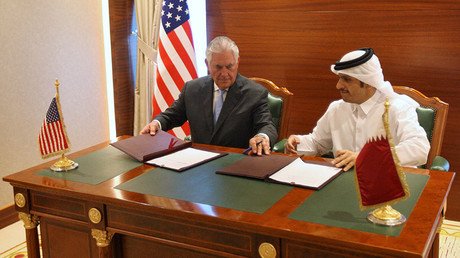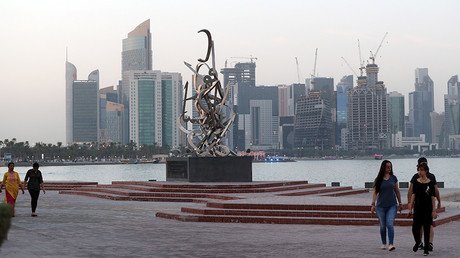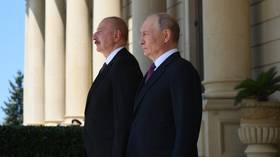Not ‘Russian hackers’? WaPo report accuses UAE of orchestrating Qatar media hack

A new report by the Washington Post, citing US intelligence, says there is evidence that the United Arab Emirates coordinated the hacking of Qatar’s state media agency (QNA), which led to the blockade of the Gulf monarchy. The UAE denied the claims.
The UAE government planned the infamous May 24 hacking of QNA, states the report citing US intelligence officials who were not named because of the “sensitive” character of the matter.
The reported evidence shows that on May 23, senior UAE officials discussed the implementation of the hack, which saw statements falsely attributed to Qatar’s emir, Sheikh Tamim Bin Hamad al-Thani, being run by QNA in a text-ticker on-air and on social media. Government Twitter handles were also hacked.
The fake statements, which spoke favorably of Iran, Hamas and Hezbollah, as well as of relations with Israel, provoke the ire of a number of Gulf states as well as Egypt, and Qatar was effectively cut off from the Arabian Peninsula with a blockade.
Qatari media was immediately banned in several Arab states, despite an official hack announcement issued by Doha within an hour of the initial attack.
The Post’s report states that it “remains unclear” if it was UAE hackers who carried out the attack or if it “contracted” others to hack Qatari media.
The UAE’s envoy to the US, Yousef al-Otaiba, reacted to the post by saying the article was “false” and the country “had no role whatsoever in the alleged hacking described” there.
He went on to accuse Qatar of “funding, supporting, and enabling extremists from the Taliban to Hamas and Gaddafi.”
UAE Foreign Minister Anwar Gargash denied any hacking of Qatari websites. Abu Dhabi didn’t ask companies to choose between doing business with the UAE or Qatar, he added.
“The Washington Post story today that we actually hacked the Qataris is also not true,” the minister said, speaking to the London-based think tank Chatham House, as cited by Reuters.
US intelligence agencies declined to comment.
This new report signals an apparent change of tune by the US media, as its earlier reports in June claimed that “Russian hackers” were allegedly to blame for the hack.
A CNN report titled, “US suspects Russian hackers planted fake news behind Qatar crisis,” citing anonymous US officials, claimed that intelligence gathered as part of an FBI investigation into the hack indicated that unnamed Russian hackers could be behind the intrusion.
A banner aired on CNN bluntly stated that “Russians planted false story behind new Mideast crisis,” citing sources.
President Vladimir Putin’s spokesman, Dmitry Peskov, denounced CNN’s story, calling it “another lie that was published.” Pointing out the unnamed sources and unverifiable information frequently used in such reports he added that “fake is a fake.”
Both the FBI and the CIA declined to comment on the investigation.
While there is similarly no verifiable proof in the Sunday report by Washington Post, it also cites a recent leak of the UAE’s ambassador’s emails, released by the GlobalLeaks hacking group.
The leaked emails revealed that Otaiba regularly communicated with a pro-Israel neoconservative think-tank called the Foundation for Defense of Democracies (FDD). While not providing any concrete details, the exchange suggests the UAE was actively working to undermine Iran’s influence in the region, making use of political, economic and “cyber” tools.
The long-brewing spat between Qatar and its neighbors, Bahrain, Saudi Arabia and the UAE, includes accusations that Doha has been cozying up to Tehran.
The first on the list of 13 sweeping demands that the Gulf states and Egypt placed before Qatar in the form of ultimatum is a complete severing of ties of Iran.
Other demands include stopping the alleged funding of terrorist groups in the region, the termination of the Turkish military presence in Qatar, the shutting down of Al Jazeera and reparations for the damage allegedly caused by Qatari interference.
READ MORE: Qatar’s rejection of Arab states’ ultimatum & denial of terrorism financing ‘shockingly naive’ – UAE
Washington has been sending mixed signals as regards to the Qatari crisis, with President Donald Trump seemingly taking credit for igniting the fallout in his Twitter posts, while Secretary of State Rex Tillerson has been at the same time attempting to negotiate a compromise between the Gulf states in a frantic engagement of shuttle diplomacy.
Trump met with the six Gulf Cooperation Council (GCC) leaders days before the crisis broke out and even discussed countering Iran with a NATO-like regional force. He was visiting Israel when the QNA got hacked.
Putin discussed the crisis with a number of Gulf leaders in a series of phone calls, underlining that it should be resolved through diplomatic means.
It comes amid a flurry of diplomatic activity between Moscow, Doha and Riyadh, with a state visit to Russia by the Saudi king expected soon.















